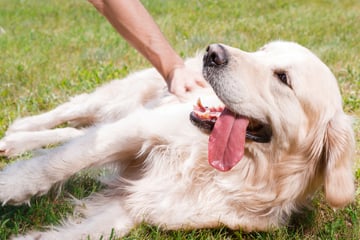Can dogs eat apples?
Apples are full of vitamins and incredibly delicious, but are they okay for our beloved canine companions? TAG24 takes a look at whether dogs can eat apples, how many are okay, and everything else you need to know.
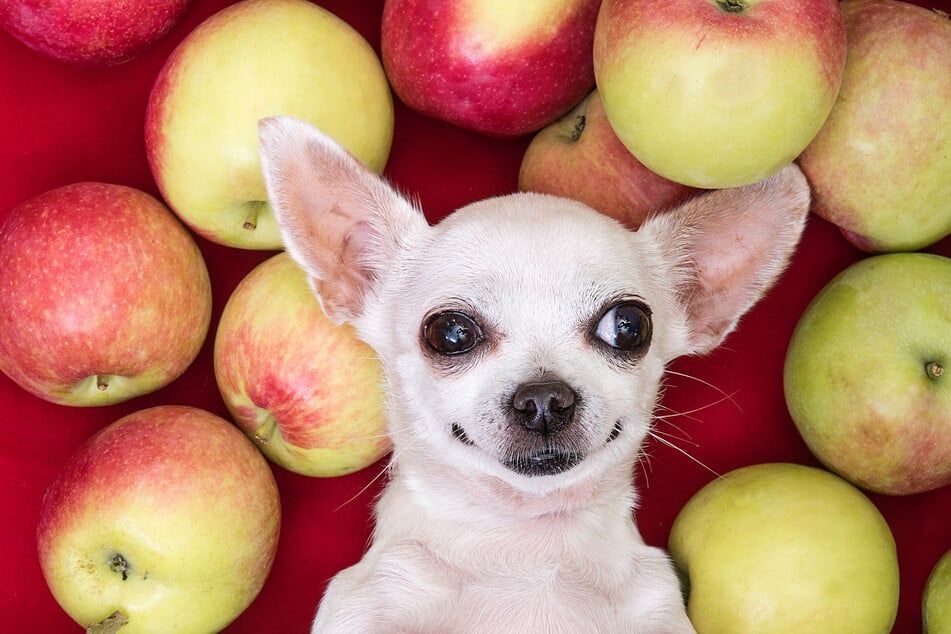
Every dog owner has experienced food envy from their perfect pooch. With those mournful eyes staring up at you filled with desire and love, it can be very hard to resist your doggo when it wants some of your food - but more often than not, you really must say no.
Are apples one of those foods where no must be the answer, or is your dog about to get a healthy dose of vitamin C?
In this dog guide, TAG24 will take you through whether dogs can eat apples. Oh, and what about apple seeds or applesauce? When have you given your doggo too much apple, and what should you keep an eye out for?
Can dogs have apples?
Yes, dogs can have and eat apples, but this must only be done in moderation, as they can upset your dog's stomach. In fact, many people actually give their dogs apples semi-regularly, as it is known to be quite good for dogs in a variety of ways. What needs to be made certain, though, is that the apple is cut up carefully before they consume it.
Apples are a fantastic source of vitamins and minerals that help to enrich and strengthen our beloved doggos when consumed in the right quantities and when certain parts of the apple are removed beforehand. That's what we're here to do, though, let's take a look at what you should know about dogs and apples.
Important: While safe consumption of apples is not something too hard to achieve with a dog, it's probably best to still consult your veterinarian beforehand.
How much apple can dogs eat?
Dogs should only be allowed to eat the equivalent of 1/4 of an apple every day, and the apple should be ripe when consumed. Under-ripe or over-ripe apples can cause digestion problems in your doggo, and the latter can also become moldy and inedible, which increases the risk that your dog will get sick.
Apples make the perfect dog snack if provided between meals but should only be given in small quantities. Overconsumption can lead to symptoms that include bellyache and diarrhea. The American Kennel Club recommends only ever feeding your dog 1–2 slices a day in total, so stick to that quarter-mark.
Of course, dogs can eat a variety of fruit (strawberries are particular favorites), but this should only be done to very specific standards. Every dog is different, so it's best to get professional advice as per the quantities wherever possible.
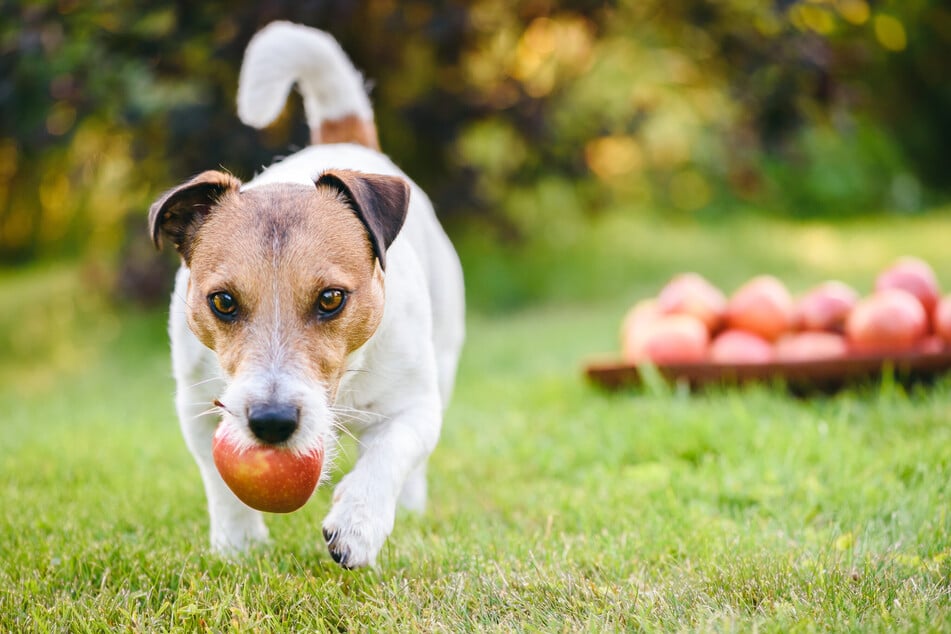
Can dogs eat apple seeds?
The core of the apple, as well as its seeds, can be very harmful to dogs because they contain nasty chemicals that even humans should avoid. Seeds of an apple contain small amounts of cyanide that can become toxic in certain situations (and if they are manufactured in particular ways).
It is very unlikely, though, that your dog will get sick from the seed of an apple. They would need to eat an enormous quantity of them for there to be enough cyanide released to cause any serious harm. That being said, your dog can still feel quite sick after eating a few seeds, and it's always best to be safe.
Keep an eye out for these symptoms if your dog has eaten apple seeds:
- Increased respiratory rate
- Strong saliva production
- Dilated pupils
- Low blood pressure
If any of these symptoms occur and you suspect that your dog has eaten apple seeds, treat it as a serious emergency and get it to the vet immediately.
Can dogs eat applesauce?
Dogs can eat applesauce as long as it is just straight apple sauce, with nothing added to it. That means no sugar, no cinnamon, no salt, no lemon juice - nothing that you would usually add to applesauce to make it as delicious as it is.
Salt isn't great, sugar will rot its teeth and cause weight gain when consumed excessively, and both cinnamon and lemon juice aren't recommended either - but don't worry, if your dog eats a small amount of applesauce when you're not looking, it'll be fine.
Why are apples good for dogs?
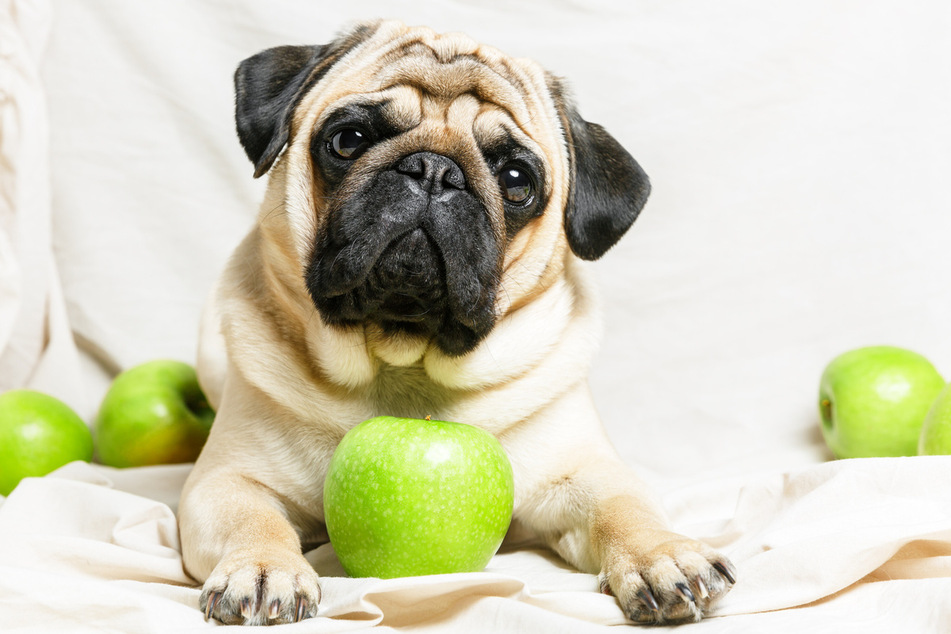
Apples aren't just the perfect treat for a human but the perfect treat for a dog as well. They are chock full of vitamins, crawling with nutrients, and capable of strengthening your dog's immune system and protecting it against disease. On top of that, they contain a lot of water, as well as sodium and potassium, helping to keep your dog hydrated and healthy.
The following vitamins and nutrients are found in apples:
- Vitamin A
- B vitamins (especially B1, B2 and B6)
- Vitamin C
- Vitamin E
- Vitamin K
- Zinc
- Iron
- Potassium
- Sodium
- Calcium
Dogs can also eat apples with the skin on; in fact, it's actually recommended. This is because the skin contains most of the "good stuff" (while the flesh is mainly water and sugar). By giving your dog a small amount of apples each and every day, you will keep its immune system strong and its body healthy.
Here are the commonly accepted benefits of apples for dogs:
- Vitamin A ensures healthier skin and good eyesight
- B vitamins protect your dog's nervous system
- The vitamins and nutrients contained in apples can protect against a variety of diseases and health conditions, including cancer and diabetes
- Apples help to improve the health of dogs overall and can provide relief for afflictions like diarrhea, constipation, and flatulence
Overall, apples are basically a doggy super-food. They're tremendously healthy when consumed in small quantities and can improve your dog's quality of life considerately if given habitually on a regular basis.
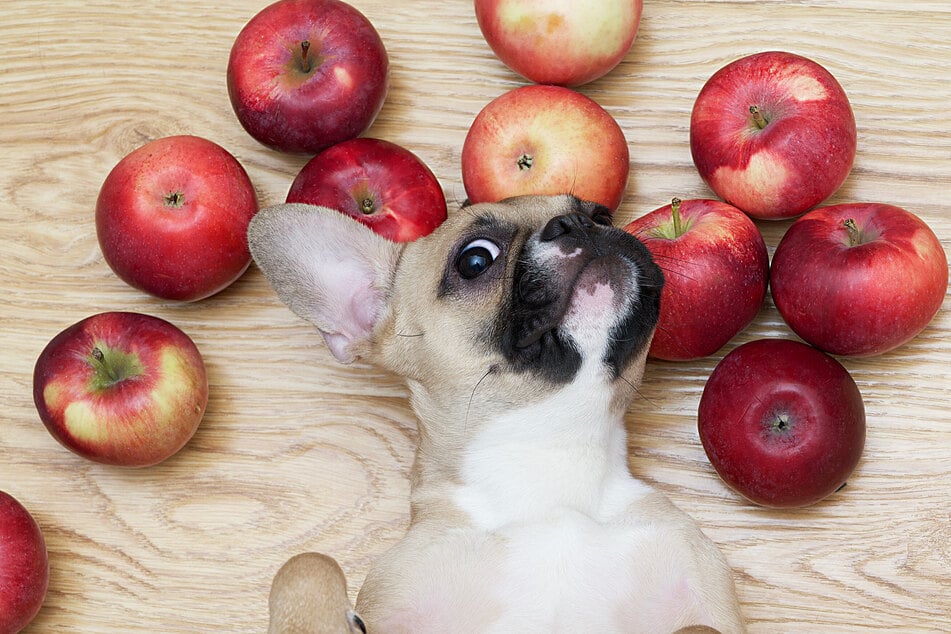
When are apples bad for dogs?
Even if your dog seems to have developed a particular fondness towards apples, it's best not to overfeed it. While in small quantities, apples will provide a variety of health benefits, in larger quantities, they will cause unpleasant symptoms and quite severe gastrointestinal problems. When fed too many apples, your dog can even overdose on them, leading to more severe health issues.
Watch out for these symptoms when feed your dog apple:
- Heartburn
- Stomach pains
- Diarrhea
- Vomiting
- Flatulence
Dogs can also be allergic to apples, and, as such, it is best to check with your vet before feeding your dog for the first time. Allergic reactions can be as mild as a little bit of itching or as severe as serious breathing difficulties. On top of that, dog owners should be cautious of poisoning from the seeds (as discussed).
Care should always be taken with your dog - they are delicate creatures and can get sick from things we normally take for granted (like chocolate, for example). While it is safe to give your dog a bit of apple, never do it without consulting the dog doc first.
Apples can be good for dogs, but only in moderation
As with anything, your dog should only eat apples in moderation. Too much can cause poisoning and a variety of nasty symptoms that we went through earlier. While it's unlikely that dogs will experience any serious poisoning from apples, it's best to be careful and only give your dog a small amount of apples at a time.
Make sure to exercise an abundance of caution when it comes to a doggy diet. Decide on how much wet food it should get, don't give it raw meat, and try to focus your dog's diet on proper dog food that has been manufactured specifically for canine- kind.
Don't take any risks, there's real reason to do so, but if something goes wrong and your dog starts experiencing symptoms of apple poisoning, take your doggo straight to the veterinarian.
Cover photo: 123RF/medvedevsergey



